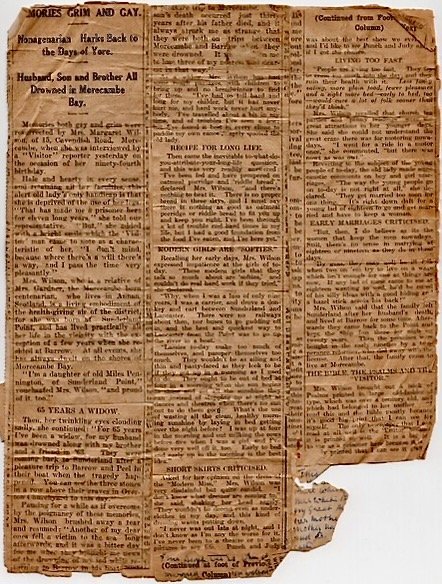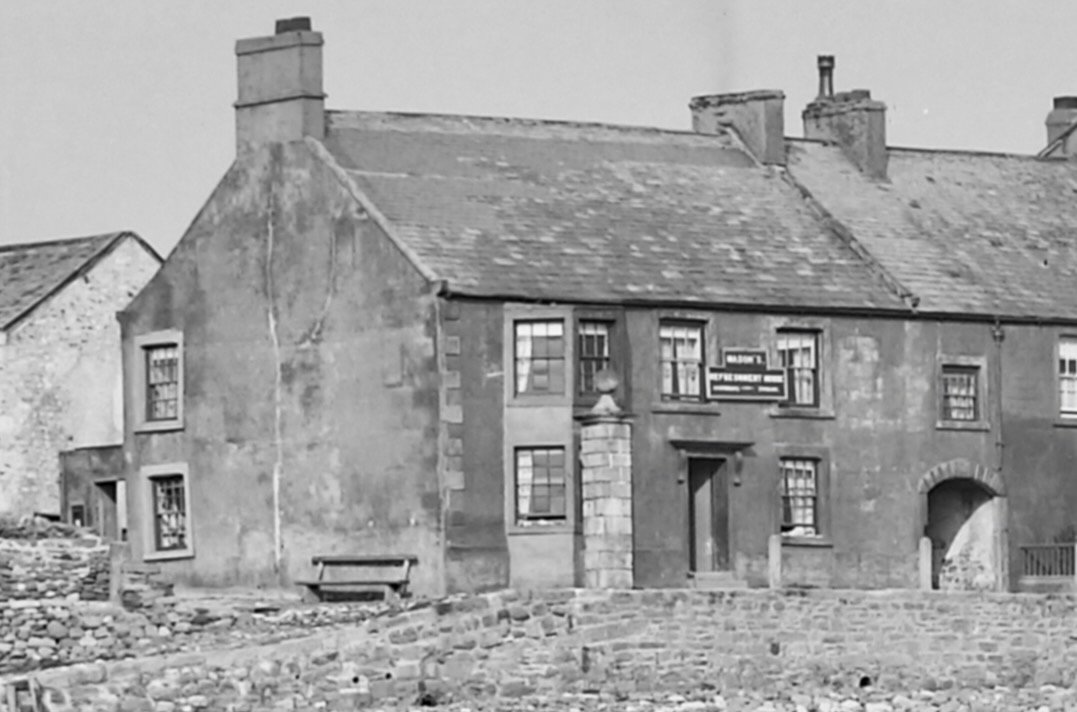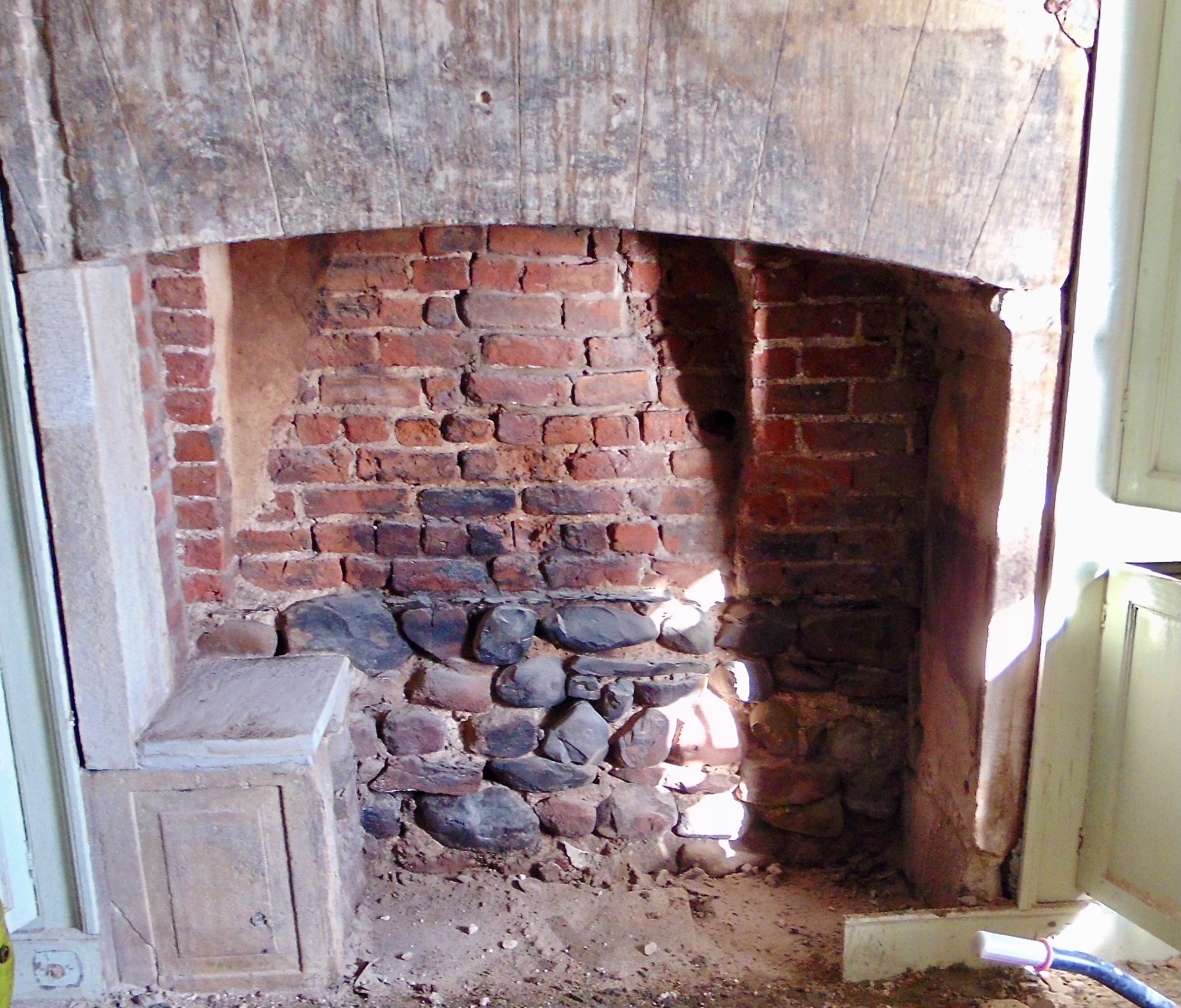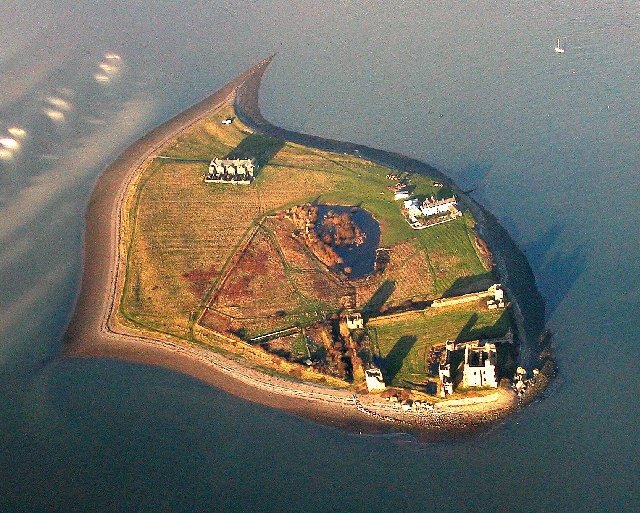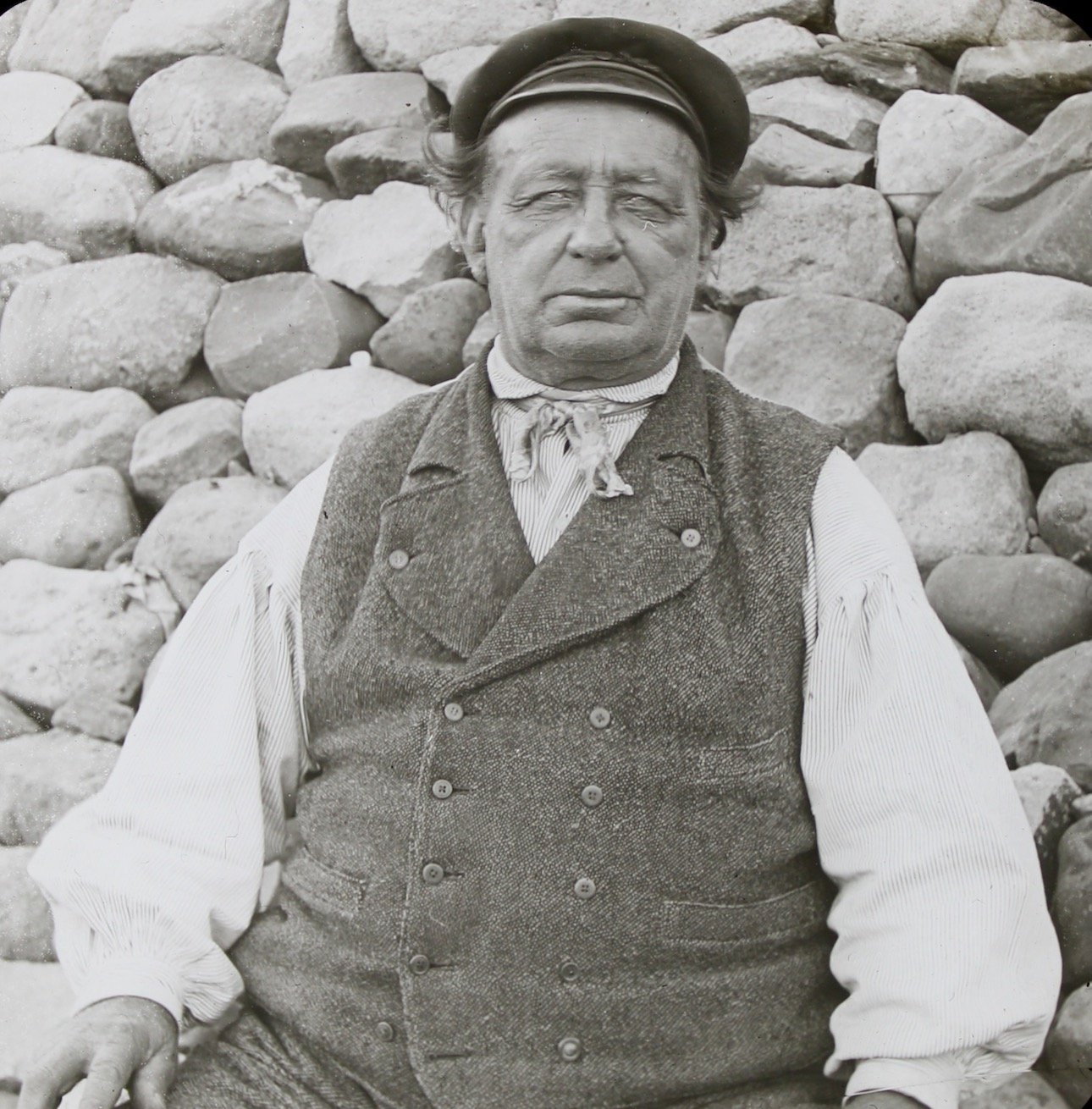‘Husband, Son and Brother, All Drowned in Morecambe Bay’
The story of Mrs Margaret (Maggie) Wilson
‘Memories Grim and Gay’
Stuck into one of the many scrapbooks of newspaper cuttings kept by Harold Gardner is this:
From the collection of Rosemary Lawn
It comes from the Morecambe Visitor in early 1929. Originally, it was cut out by Harold’s uncle James W. Gardner, Margaret was a great Aunt of his.
Someone will have called the newspaper to say an old Morecambe ‘character’ was celebrating their 94th birthday with a story to tell. The Visitor sent a along a correspondent to fill in a couple of columns.
But it’s much more than that - it’s a great but tragic story.
The Visitor article starts:
Hale and hearty in every sense and retaining all her faculties, this alert old lady’s only handicap is that she is deprived of the use of her legs, which has made her a prisoner for 11 long years, but she added with a bright smile, “I don't mind because where there's a will there's a way and I pass the time very pleasantly.”
“I'm the daughter of old Miles Pennington of Sunderland Point” vouchsafed Mrs Wilson, “and proud of it.”
The Old Customs House. Detail from a William Wells painting c1900: Courtesy Harris Museum and Art Gallery
Miles and Elizabeth Pennington lived for a time in the Old Customs House, then known as the ‘cottage in the field’ (today 3A). Miles, originally from Skerton in Lancaster, was an agricultural labourer and fisherman.
Margret (known as Maggie within the family) was born in 1835, one of six children, four girls and two boys. A big family in a small house.
She tells The Visitor, “Why, when I was a lass of only nine years, I was a carrier and drove a donkey and cart between Sunderland and Lancaster. There were no railways about then, and no buses to go gadding off in. The only, best and quickest way to Lancaster from the Point was to go up the river in a boat.”
And proudly adds, “I was up at 4:00 in the morning and was milking the cows before 5 when I was a girl, and I've done very well off it, early to bed and early up is the best idea. What's the use of wasting all the clean healthy morning sunshine by lying in bed getting over the night before.
At 15, Margaret was learning the pub trade as a bar servant working for Innkeeper Hannah Hartley at the Lodge’s Arms in Torrisholme . This was probably arranged for her by her future husband, Thomas Wilson, the Innkeeper of the Ship Inn at the Point. Tom’s father was the tenant of Torrisholme Hall Farm, only a short walk away from the Lodge’s Arms.
More about Tom.
Thomas Wilson
Born in 1813 in Halton, Thomas was one of eight children in a farming family. In 1845, he married his first wife, Ann Barton of Quernmore, also one of eight children. They take up the tenancy of the Ship Inn, Overton, where daughter Isabella is born in 1846. Shortly after they move to Sunderland Point to the Ship Inn, and daughter Nancy is born in 1848.
The Ship Inn (Hotel) Overton as it is today
The Ship Inn, later as the Temperance Hotel in a photograph c1900 by John Walker: Courtesy Lancaster City Museums
Sadly, Ann, aged 33, dies in1852, and the children are sent to live with separate relatives. Isabella to the Wilson farm in Torrisholme and Nancy to the Barton family in Quernmore.
Marriage
Four years later, in 1858, Thomas Wilson, now 45, married Margaret, who was then aged 22.
From the threads we have, Margaret adored Thomas and remembered him fondly in her Visitor interview. He certainly leaves a strong impression. Now this may be unfair, but we report it anyway.
From the Lancaster Gazette in September 1860.
NARROW ESCAPE: - On Thursday night, as Mr Wilson, landlord of ;the Sunderland hotel (sic), was returning home having been enjoying himself with his friends had a very narrow escape from being drowned.
He left Overton in ample time to cross before the tide came in, but in consequences of his faculties being clouded, he turned into the sands before the bridge (it is supposed under the impression that he had crossed it) and drove the horse head first into the pool where it stuck fast.
Mr Wilson was on top of the cart at the time and was either unable to help himself or render any assistance to his horse and had to remain until the tide receded.
A cask of ale and a sack of flour in the cart were washed away. About 6:00 on the following morning, a fisherman going to his nets found the cask of ale, and the horse drowned. He concluded that Mister Wilson was drowned and conveyed, as he supposed the mournful intelligence, to Sunderland but rejoiced to find that Mister Wilson had arrived safe a short time before and had gone to bed.
The horse was an old favourite and a gift from his late father.
The Annual Dinners
Settled down in the Ship Inn, Thomas and Margaret arranged a series of annual dinners, on behalf of Joseph Leigh Esq. (of Downeyfield, Middleton) given to the tenants of the farms over which he had shooting rights. Lively coverage appeared in the Newspapers.
In 1859…
‘Took place at the house of Mr Thomas Wilson, the Ship Inn, Sunderland, where about 70 (!) sat down to the enjoyment of a good substantial repast’ and ‘Three gentlemen contributed to the harmony of the evening by singing several songs. Mr Gornal sang a humorous song called ‘The Auction’, which elicited an encore, and Mr Thompson appeared very happily in “Amongst the Barley Straw.’
The original fireplace of the ‘Ship Inn’ revealed during the 2019 renovation
In 1860…
This year, only 40 people sat down to 'the excellent repast' at the Annual dinner. Mr Gornal received special mention for 'raising peals of laughter by his irresistibly comic song "The Auction"'.
‘After the dinner party broke up, the young people of the neighbourhood enjoyed themselves with a dance which continued with great spirit till morning.’
And In 1861…
Again, about 40 and after the usual toasts ‘several songs were sung, including, inevitably by Mr Gornall, ‘The Auction’ and ‘Me and my wife Betty’ by Mr H. Birkett and:
In the course of the evening, in consequence of a remark made by Mr Gornall that though he had been a farmer all his life, he had never seen a hare sitting, Mr Leigh’s gamekeeper, Pennington, brought in a hare which he had tamed, which SAT on the table and performed several tricks Pennington had taught it.
On to 1862…
The Dinner was held at the Ship Inn, Sunderland, and was provided by Mr Thos. Wilson, who, we need scarcely add, exerted himself with complete success in providing a repast worthy of the occasion. About 50 sat down.
It was all going well for Thomas and Margaret. Business was brisk, the attached farm was manageable, and two children had been born, Mary in 1859 and Edward in 1861.
Loss of the alcohol license
Before the Annual Dinner of 1863, the license renewal to sell alcohol had been refused. (See our story) This would have been a financial torpedo. The Point had been a favourite destination for parties visiting by boats from Lancaster, and the first wagonettes of thirsty visitors were arriving from Morecambe.
The Ship Inn had an enforced change of name, becoming:
Lancaster Guardian June 1862: Courtesy Guardian Newspapers.
Worse was to come, much worse.
The Tragedy, October 1863
An abridged report from the Lancaster Gazette.
Shocking boat accident off Sunderland
It is our painful duty to record a shocking boat accident which occurred on Thursday night at Sunderland when the lives of three men have been sacrificed. The three unfortunate men were named Thomas Pennington, William Curwen and Thomas Wilson. They all belonged to Sunderland
From what we can learn, the brother of Pennington, who is the pilot stationed at Piel Island, took the three deceased men to Piel some days ago to assist him in doing some repairs.
On Thursday evening, about dusk the Fisherman's Friend, a large boat taken by the men was observed off Sunderland making up the river.
On Friday morning, however, the boat was observed in a shattered condition, one side and the stern being staved in, the mass broken and the anchor and chain gone. About 20 yards from the boat the bodies of Pennington and Curwen were found lying on the sand both evidently having been dead for some time.
For some time after the event, it was not clear how many were in the boat (when) it started from Piel and hopes were entertained that Wilson had escaped but all doubts upon this point were dispelled yesterday afternoon by a telegram stating that when the boat left the three unfortunate men were in her.
A great gloom has been cast on the inhabitants of the village and upon all in the district by the sad event. Pennington, we believe was the principal support of an aged father and mother and Wilson leaves a wife and several children to deplore his loss. Curwin, we believe had no one dependent upon him. Up to the hour of going to press, nothing was heard of the body of Wilson. An inquest on the bodies of Pennington and Curwin will probably be held today.
John Pennington another brother of Margaret who the three men were visiting. As well as Pilot, he was also the tenant of the Ship Inn on Piel.
Sunderland Point to Piel Island across Morecambe Bay, illustration Paul Hatton: Courtesy Bartholomew Maps.
A modern photo of Piel Island: Photo Simon Ledingham
The bodies of Pennington and Curwen were recovered – but not Tom’s - and laid out at the Ship Inn, where a Coroner's Court was convened (Imagine! Margaret must have been in distress). The verdict was 'Death by Drowning.' It was a terrible shock, Thomas Pennington was a skilled and experienced sailor, he and his boat, the Fisherman's Friend, had featured in competitive regattas at Sunderland and elsewhere.
Within days, John B. Mansergh, the owner of the Ship Inn, wrote a heartfelt letter to the Lancaster Gazette proposing an appeal fund.
THE LATE MELANCHOLY ACCIDENT AT SUNDERLAND
The letter reminds the reader of the incident and makes this plea.
Now, Sir, if only a small sum could be raised for the aged and infirm Mr and Mrs Pennington (Margaret’s parents), it would at least brighten the cloud which overhangs the prospect of a dreary winter and, in some degrees, soothe their sorrows by receiving a token of Christian sympathy and by this means illustrates the loving kindness of them who in judgement remember mercy.
The fund raised over £15 (almost £1600 today). John Mansergh contributed £1.
Margaret, only 31, had lost both her husband and brother, leaving her with two young children aged five and two. The body of her husband was still missing, and she had the hotel and farm to run. Made of the strongest stuff, she carried on.
Incredibly, the Annual Dinner occurred less than a month after the tragedy, at the end of October.
In 1863…
In an offhand, almost callous report, the Lancaster Gazette says.
‘A most excellent and substantial dinner was provided by Mrs Wilson (an unfortunate sufferer by the recent boat accident) and was served in good style.’
The event was very cheerful. Apparently.
‘The toast of the evening was drunk amid loud cheers, and musical honours were recorded. Other toasts, including the health of the chairman (drunk in a bumper), followed, and the evening was most happily spent.
(‘Drunk in a bumper’ refers to the glasses filled to the brim.)
Alcohol served in such quantity is a surprise given the presence of two reverend gentlemen at a Temperance establishment.
The body recovered
Three months later, the body of Thomas Wilson was found on Tully Bank, Fleetwood. It was described as being ‘in a good state of preservation’ and identified by his brother Robert, a farmer at Middleton. Thomas was later interred in Overton Parish church alongside Pennington and Curwen.
In the Visitor article, many years later, Margaret remembers.
Then, her twinkling eye clouding sadly, she continued, “For 65 years, I've been a widow for my husband was drowned along with my brother and a friend in ’63. They were coming back to Sunderland after a pleasure trip to Barrow and Peel (sic) in their boat when the tragedy happened. You can see the three stones in a row above their graves in Overton churchyard to this day.”
Margaret continues at the Ship for another year or so, then decides to take on the vacant tenancy of the Old Hall and set up an unlicensed establishment. In 1886, she posted this advertisement in the Lancaster Gazette.
Courtesy Guardian Newspapers
From the account of J.W. Gardener, it’s badly run and in fear of a police raid. It does not last long, and the family move on.
In the 1871 census, Margaret was a lodgings housekeeper at 56 Queen Street in Morecambe with children Mary, now aged 12, and Edward, 10. She was still there in 1881. Margaret lists her daughter (poor) Mary,22, as a domestic servant. Edward, 20, is in Manchester working as a warehouseman.
Jumping ahead another ten years, the family are together and back in the licensed trade, running the Crows Nest Hotel in Barrow. Margaret (54) is described as the Hotel Manager (pub), her son Edward, Hotel Manager (Inn), and (poor) Mary as the barmaid.
They are the second tenants of the newly built hotel. John Dixon, the previous tenant, was fined and then fired for allowing drunkenness. In the autumn of 1891, daughter Mary marries Richard Pearson, a gardener eight years her senior, and they move to Grange-over-sands.
From newspaper accounts, Edward had become a popular figure around the town and was a key organizer in a Barrow Regatta, even receiving the award of a watch at their annual dinner. He had advertised 'the details concerning the regatta available from the Crown's Nest.'
The Crows Nest Hotel, Barrow as it is today.
The Second Tragedy
August 1892, from the Lancaster Gazette.
‘Edward Wilson was with three companions in a small yacht, when off Heysham Point, Wilson, when steering in heavy seas, was washed overboard and, being a strong swimmer, was able to keep afloat for some time, but as the boat reached him, another heavy wave, washed him away. A great favourite in aquatic circles, as well as the general public, he leaves an aged, widowed mother to mourn his loss.’
One of his companions said later that during the boat trip, Edward had pointed out the spot where his father had drowned some 30 years before. As with his father, his body was missing until sometime later.
The Gazette reported:
‘Early on Saturday morning, the body of a man was washed ashore…in Morecambe Bay. The body was greatly decomposed, and the features were perfectly unrecognisable. At the inquest held later in the day, the remains were identified by means of the clothing and papers found therein as those of Mr Edward Wilson, 33 years of age and late landlord of the Crow Nest Hotel Barrow…It is a singular coincidence that (his) father drowned in the same locality over 30 years ago.’
Edward was interred in the grave of his father at Overton Parish Church.
The Visitor article in 1929.
Pausing for a while as if overcome by the poignancy of these memories, Mrs Wilson brushed away a tear. She resumed, “another of my dear ones fell victim to the sea long afterwards, and it was a bitter day for me when they called to tell of the drowning of my lad when he was sailing. The death occurred just 30 years after his father died, and it always struck me as strange, they were both on trips between Morecambe and Barrow when they were drowned.”
After this catastrophe, Margaret moves in with long suffering Mary and her husband at Yewtree Cottage in Grange. It was more bad news when Richard died in March 1907, Margaret and Mary packed up sticks and moved back to busy and bustling Morecambe.
The final years
In the 1911 census, Mary is now the head of the household as a lodging housekeeper at 15 Cavendish Road, Sandylands - a good address at the time. Margaret is 75 and described as an 'Old Age Pensioner'.
15 Cavendish Road as it is today.
They are still together at the same address in 1921.
The Visitor journalist rattled through trivial questions on modern life and fast living, including the skirt length of young women (we would have boxed his/her ears for this) They were winding to a conclusion with this question.
(To) what qualities do you attribute to your long life?
“I've been fed and have prospered on oatmeal porridge and *riddle bread”, declared Mrs Wilson “, and there's nothing to beat it, there's no proper bread these days, and I can say there is nothing as good as oatmeal porridge or riddle bread to keep you right. I've been through a bit of trouble and have hard times in my life, but I had a good foundation from the food I've had, and I'm here yet”
*Riddle bread Yorkshire; griddle cakes made from oatmeal mixed with water and left overnight to ferment, then baked on one side on a griddle—Oxford reference.
Shortly after the Visitor correspondent called, Margaret Wilson died on December 5th, 1929, aged 94. Mary arranged for her to buried with her husband and son in St Helen’s churchyard at Overton.
There is no existing photo of Margaret and The Visitor correspondent forgot to take a camera. The best we can do is to show again this striking photo of William ‘Barney’ Dickinson - who was Margaret’s Uncle!
William ‘Barney’ Dickinson, photo John Walker: Courtesy Lancaster City Museums.
Many thanks to Paul Hatton for the illustration
